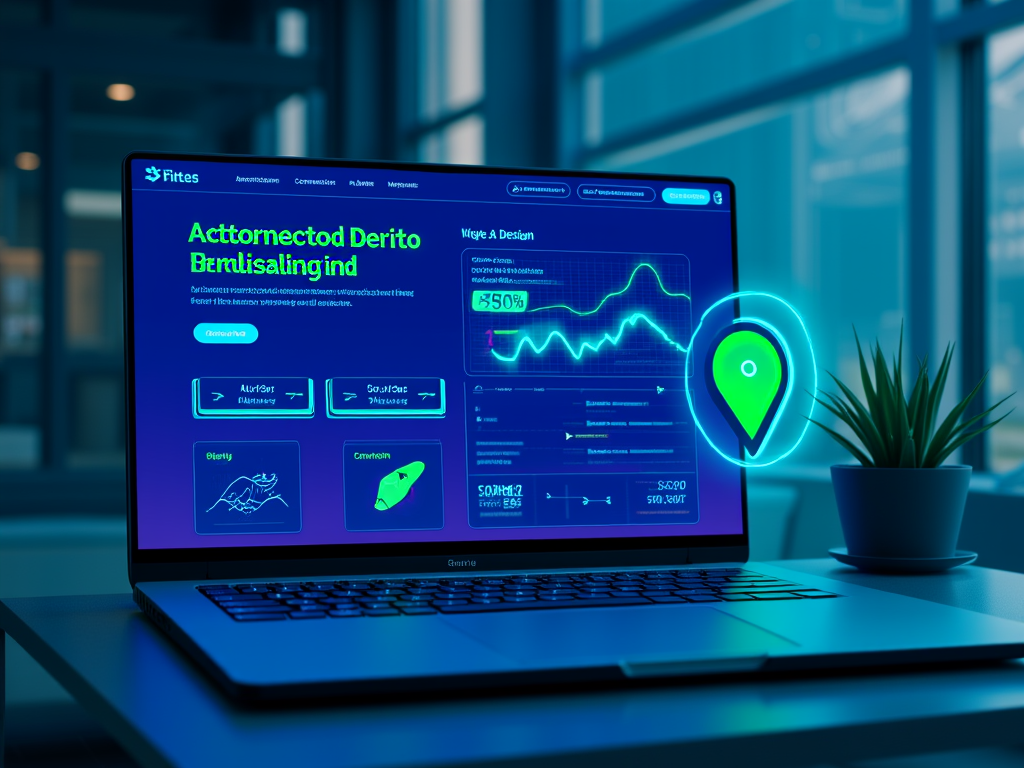Choosing the right web studio for your website project
Introduction
When you embark on the journey of creating a website, the choice of your web studio is the compass that will guide you through. It’s not just about a design; it’s about crafting a digital experience that resonates with your audience. Whether you’re dreaming of a sleek corporate site, a dynamic online store, or an expressive portfolio, this decision can shape your vision into reality. But how do you make the right choice? Let’s delve into the essential aspects of choosing a web studio that aligns not just with your goals but your very essence.
Defining Your Project Requirements
Before you even think about reaching out to studios, you need to clarify your project’s purpose, scope, and requirements. This first step is the foundation of a successful collaboration. Imagine standing at a crossroads; knowing your destination helps you choose the right path.
-
Purpose and Objectives: Ask yourself—what is your website supposed to achieve? Whether it's an informational hub, an e-commerce power player, or a stunning personal blog, different studios cater to different needs. Specialized studios can bring your unique vision to life with precision[1].
-
Functional Requirements: What features do you absolutely need? Picture this: a payment system that seamlessly integrates with your online store, or a user-friendly content management system that allows you to update your portfolio with ease. Every requirement you jot down paves the way for studios that can deliver exactly what you envision[1][5].
-
Budget and Timeline: Reality check! Set a budget that matches your ambitions but is grounded in your financial situation. A higher budget can get you more seasoned talent, but remember, it isn’t the only ticket to quality[1][2]. Similarly, think about how quickly you want your site to go live. A realistic timeline will save you from stress in the long run.
-
Target Audience and Marketing Goals: Define who you're talking to. Are you reaching out to tech-savvy millennials or seasoned professionals? Understanding your audience not only shapes your design but also guides your marketing strategies down the line[5].
Example: If you run a quaint local café looking to expand your presence, you need a studio experienced in creating engaging e-commerce websites with robust local SEO capabilities. Contrarily, a luxury brand might want a studio specializing in high-end visual aesthetics.
Evaluating Web Studios
Once your project frame is set, it’s time to search for studios that can bring it to life. But how do you sift through the myriad of options to find the gold?
Key criteria with practical tips:
-
Portfolio Review: Dive into the studio’s past projects. Here’s where you’ll gauge their style, creativity, and the type of work they produce. Look for projects that resonate with your own vision. If their work feels like a stranger's design, it’s a slight red flag[1][3][4].
-
Experience and Expertise: How long have they been in business? An established studio might carry refined skills, but it’s also crucial they’re familiar with the latest technologies relevant to your project. They'll be better at navigating the winding roads of modern web development trends[1][5].
-
Client Reviews and Testimonials: Don’t just take their word for it. Seek out independent feedback that reveals their professional conduct. A studio with stellar testimonials might just be the partner you're looking for[3].
-
Comprehensive Services: Ideally, you want a studio that offers end-to-end services—design, development, SEO, and post-launch support. Think about it: fewer vendors mean less hassle, clearer communication, and more streamlined collaboration[3][7].
-
Communication and Collaboration: Evaluate how they communicate with you. The responsiveness and clarity of their communication often reflect their professionalism. You want partners who are as invested as you are in your project from start to finish[3][2].
-
Pricing Transparency: Look for studios that are upfront about their costs. Hidden fees can turn a promising project into a frustration fest. Make sure the value offered matches the price tag[3][4].
Visual aid suggestion: A matrix summarizing these criteria could serve as a quick reference guide for decision-making.
| Criteria | Importance | What to look for |
|---|---|---|
| Portfolio | High | Quality, relevance, creativity |
| Experience | High | Years in business, tech stack knowledge |
| Reviews | Medium | Positive client testimonials |
| Services | High | Comprehensive solutions, ongoing support |
| Communication | High | Clear and timely responses |
| Pricing | Medium | Transparency, within budget |
Additional Practical Tips for the Selection Process
Armed with knowledge, you’re ready to engage. Here are further insights to enhance your studio selection process:
-
Prepare a Detailed Brief: Craft a comprehensive project brief. Outline your design visions, marketing objectives, target audience, and desired functionalities. This script helps studios tailor their proposals to your vision accurately[5].
-
Conduct Interviews and Ask for Proposals: Engage with the studios you think are a fit. Ask them to present their strategies for your project. This exercise reveals not just their expertise but also their enthusiasm for your ideas[2][5].
-
Check Technology & Scalability: Does the studio build platforms that can grow with you? Ensure their designs are responsive, mobile-friendly, SEO-optimized, and built on modern technologies. This foundation is vital for your website's future longevity[3].
-
Set Clear Expectations: Communication doesn’t stop after hiring; it’s just beginning. Share your branding guidelines, content timestamps, and feedback processes to create a transparent environment. Avoid the classic miscommunication pitfalls that can derail great projects[2].
Original idea: Consider seeking studios that not only design but also integrate analytics and customer behavior insights into the website to help cement your marketing strategies in their evolving landscape post-launch.
Localized Example: If you're a thriving St. Louis business, focusing on local SEO strategies is crucial. A studio knowledgeable of the region’s market nuances will help you tap into those local customers effectively[4].
In this digital dance, where creativity meets functionality, choosing the right web studio is paramount. Each step in the process, from defining requirements to evaluating potential partners, is like laying the bricks of a sturdy bridge leading you to your online goals. The right choice today sets the canvas for broader successes tomorrow.
FINDDOMAIN.GE (Internet services LLC) is a very interesting and rapidly developing IT company. The main directions are: web development, domain and web hosting. It also offers clients sub-services and outsourcing related to the main services.
BEST OFFERS:
Do you want to create your own company website or create your own online business on the Internet?
– WEB HOSTING
– DOMAIN REGISTRATION
– WEB DEVELOPMENT
– SITE BUILDER



Understanding Long-Term Partnership Potential
As you sift through potential web studios, consider the long-term relationship you'll be forging. Your website is not a one-and-done project; it’s a living entity that evolves with your business. Choose a studio not just by their skills today but by their ability to grow with you tomorrow.
-
Ongoing Support and Maintenance: Inquire about the stability of their support services. Will they be available for future updates or troubleshooting? A studio that offers maintenance packages can save you time and stress down the line[6].
-
Adaptability to Trends: The digital landscape is ever-changing, with new technologies and trends emerging constantly. Engage with studios that demonstrate awareness and adaptability to these evolutions. Ask how they plan to incorporate future trends into your project, ensuring your website remains relevant[6].
Visual Story: Picture a young, vibrant tree, nurtured and pruned by a seasoned gardener. As the seasons change, the garden flourishes, just as your website should with the right studio.
Building Effective Communication Channels
Communication forms the bedrock of a successful partnership. Establish clear channels that allow for open dialogue throughout the project lifecycle.
Setting Up Your Communication Framework
-
Regular Check-Ins: Agree on regular updates to discuss progress, any roadblocks, and adjustments to the timeline or scope. This is where you can voice your opinions and ensure alignment[2].
-
Project Management Tools: Use tools such as Trello, Asana, or Slack. These platforms foster collaboration and real-time feedback. They keep everyone on the same page and prevent details from slipping through the cracks[7].
-
Feedback Mechanism: Establish a structured way to give and receive feedback. This step is crucial for maintaining quality and direction. Honest feedback helps steer the project toward the best results[2].
Example: A marketing agency might use a tool like Slack for day-to-day communication while organizing project statuses through Asana. This method bridges gaps and keeps team members aware of their shared goals.
Finalizing Contracts and Agreements
After narrowing down the contenders, it’s time to put pen to paper. Your contract needs to encompass both expectations and obligations to avoid misunderstandings.
Essential Elements in Your Contract
-
Scope of Work: Clearly outline what your project involves, including deliverables, timelines, and milestones. A well-defined scope reduces the chance of scope creep and keeps the project on track[8].
-
Payment Terms: Specify payment schedules, milestone payments, and consequences of delays. Transparency in finances builds trust, ensuring both parties are aligned from the outset.
-
Intellectual Property Rights: Address ownership of the final product. Ensure that all deliverables will belong to you once finalized—this protects your ideas and business identity[8].
Measuring Success Post-Launch
Your new website represents not just a digital space but a powerful tool for achieving business objectives. Post-launch is where the rubber meets the road.
Key Performance Indicators (KPIs) to Track
-
Traffic and Engagement: Monitor website visitors, bounce rates, and time spent on site. Understanding user behavior is crucial for optimizing the user experience and achieving your marketing goals.
-
Conversion Rates: Assess how well your website converts visitors into customers or leads. A successful website should drive actionable results— purchases, inquiries, or subscriptions.
-
Feedback Collection: Post-launch, seek feedback from users. Their experience on your site will provide invaluable insights into what works and what needs improvement. Consider using tools like Google Analytics or Hotjar for user behavior tracking.
Conclusion
Choosing the right web studio transcends simply getting a website built; it’s about forming a partnership that nurtures growth, creativity, and long-term success. By clearly defining your project requirements, evaluating potential partners with critical attention, and establishing robust communication channels, you can pave the way for a collaborative environment that thrives on innovation and shared goals.
As you embark on this exciting journey, remember the importance of adaptability, transparency, and ongoing support. Your website isn't a standalone silo; it’s an integral aspect of your brand’s evolving narrative. With the right web studio by your side, you’ll not only see your digital vision come to life—you'll also position your business for future opportunities and challenges.
For more insights, check out these videos that highlight key strategies in choosing and working with web studios:
- The Importance of Website Design
- How to Choose the Right Digital Marketing Partner
- Effective Communication in Project Management
References:
[1] Website Design Tips
[2] Communication Strategies for Success
[3] Understanding Client Requirements in Web Development
[4] Evaluation Checklist for Web Studios
[5] Best Practices in Online Development
[6] Long-Term Digital Partnerships
[7] Utilizing Project Management Tools
[8] Contracts and Agreements in Web Development
FINDDOMAIN.GE (Internet services LLC) is a very interesting and rapidly developing IT company. The main directions are: web development, domain and web hosting. It also offers clients sub-services and outsourcing related to the main services.
BEST OFFERS:
Do you want to create your own company website or create your own online business on the Internet?
– WEB HOSTING
– DOMAIN REGISTRATION
– WEB DEVELOPMENT
– SITE BUILDER





![Website Hosting Providers in [Local Area]: What to Choose](https://besthosting.ge/wp-content/uploads/2025/08/website-hosting-providers-in-local-area-what-to-choose.jpg)
![WordPress Website Experts in [Your City]](https://besthosting.ge/wp-content/uploads/2025/08/wordpress-website-experts-in-your-city.jpg)

![Web Development Services in [Local Area] for E-commerce](https://besthosting.ge/wp-content/uploads/2025/08/web-development-services-ecommerce-local-area.jpg)